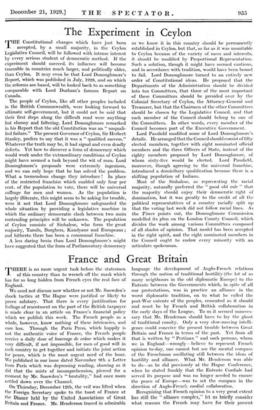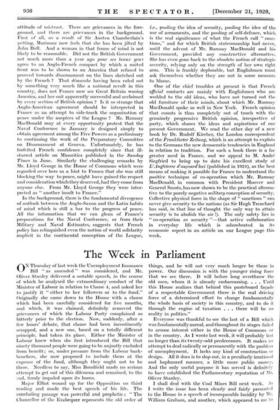France and Great Britain T HERE is no more urgent task
before the statesmen of this country than to wrench off the mask which has for so long hidden from French eyes the real face of England.'
We need not discuss now whether or not Mr. Snowden's shock tactics at The Hague were justified or likely to prove salutary. That there is every justification for feelings of resentment on the part of the British taxpayer is made clear- in- an article on France's financial policy which we publish this week. The French people as a whole, however, know nothing of these intricacies, and care less. Through the Paris Press, which happily is not the authentic voice of France, the French people receive a daily dose of bourrage de crone which makes it Very difficult, if not impossible, for men of good will in each country to get together and initiate the joint action for 'peace, which is the most urgent need of the hour. We published in our issue dated November 9th a Letter from Paris which was depressing reading, showing as it did that the mists of incomprehension, pierced for a moment by Mr. Snowden's " brutality," had once more settled down over the Channel.
On. Thiirsday, December 12th, the veil was lifted when the Foreign Secretary spoke to the toast of France at the Dinner held by the United Associations of Great Britain and France. Mr. Henderson traced in admirable language the development of Anglo-French relations through the notion of traditional hostility (the lot of so many neighbours in the old diplomatic Europe) to the Entente between the Governments which, in spite of all our protestations, was in practice an alliance in the worst diplomatic tradition, on to what he called the post-War entente of the peoples, cemented as it should and must be by French and British collaboration in the early days of the League. To us it seemed unneces- sary that Mr. Henderson should have to lay the ghost Of traditional enmity. Only a very slow-moving intelli- gence could conceive the present trouble between Great Britain and France in terms of the past. Yet from all that is written by " Pertinax " and such persons, whom we in England—wrongly—believe to represent French opinion to-day, one cannot but see the mental compass of the Frenchman oscillating still between the ideas of hostility and alliance. What Mr. Henderson was able to do—as he did previously at the Hague Conference, when he stated frankly that the Entente Cordiale had served its purpose and was no longer needed to ensure the peace of Europe—was to set the compass in the direction of Anglo-French cordial collaboration.
Recognizing that French opinion to a very great extent has stilt the " alliance complex," let us briefly consider what reasons the French may have for their present attitude of mistrust. There are grievances in the fore- ground, and there are grievances in the background. First of all, as a result of Sir Austen Chamberlain's petting, Marianne now feels that she has been jilted by John Bull. And a woman in that frame of mind is not likely to be reasonable. Did not the British Government not much more than a year ago pour ses beaux yeue agree to an Anglo-French compact by which a united front was to be shown to an America that refused to proceed towards disarmament on the lines sketched out by the French ? That demarche having been ruled out by something very much like a national revolt in this country, does not France now see Great Britain wooing America, and her suit apparently successful and acclaimed by every section of British opinion ? Is it so strange that Anglo-American agreement should be interpreted in France as an attempt to side-track the organization of peace under the auspices of the League ? Mr. Ramsay MacDonald may at every opportunity protest that the Naval Conference in January is designed simply to obtain agreement among the Five Powers as a preliminary to continuing the work of the Preparatory Committee on Disarmament at Geneva. Unfortunately, he has forfeited French confidence completely since that ill- starred article on Minorities published in the Sunday Times in June. Similarly the . challenging remarks by Mr. Lloyd George in the House of Commons which were regarded over here as a hint to France that she was still blocking the way to peace, might have gained the respect and consideration which they deserved, had they come from anyone else. From Mr. Lloyd George they were inter- preted as " another insult to France."
In the background, there is the fundamental divergence of outlook between the Anglo-Saxon and the Latin habits of mind which is still a bar to the progress of peace. All the information that we can glean of France's preparations for the Naval Conference, or from their Military and Naval Estimates, suggests that French policy has relinquished even the notion of world solidarity implicit in the continental conception of the League, i.e., pooling the idea of security, pooling the idea of the use of armaments, and the pooling of self-defence, which is the real significance of what the French call " sanc-. tions," and for which British statesmanship had never, until the advent of Mr. Ramsay MacDonald and his Government, provided any constructive alternative. She has even gone back to the obsolete notion of strategic security, relying only on the strength of her own right arm. This is frankly deplorable, but Englishmen must ask themselves whether they are not in some measure to blame.
One of the chief troubles at present is that French official contacts are mainly with Englishmen who are wedded to the old ideas, whO have not turned out the old furniture of their minds, about which Mr. Ramsay MacDonald spoke so well in New York. French opinion that counts is thus completely out of touch with the genuinely progressive British opinion, irrespective of party, which shares the ideas and aspirations of our present Government. We read the other day of a new book by Dr. Rudolf. Kircher, the London correspondent of the Frankfurter Zeitung, which is an attempt to explain to the Germans the new democratic tendencies in England in relation to tradition. For such a book there is a far greater need in France, and we appeal to M. Andre Siegfried to bring up to date his excellent study of .V.Angleterre d'awiourd'hui (published in 1924), as the best means of making it possible for France to understand the positive teclmique of co-operation which Mr. Ramsay MacDonald, in common with President Hoover and General Smuts, has now shown to be the practical alterna- tive to the purely negative military conception of security. Collective physical force in the shape of " sanctions " can never give security to the nations (as Sir Hugh Trenchard has said, in that line of thought the only way to attain security is to abolish the air !). The only safety lies in " co-operation as security "—that active collaboration in everyday life which is adumbrated in its economic aspect in an article on our League page this week.



































 Previous page
Previous page